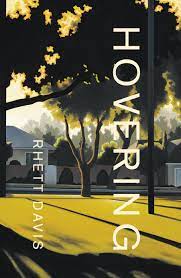Author: Rhett Davis
Title: Hovering
Publisher: Hachette; RRP: $32.99
In 2015 Rhett Davis completed an MFA in Creative Writing at the University of British Columbia in Vancouver. Hovering was written as part of a PhD at Deakin University and won the Victorian Premier’s Literary Award for an Unpublished Manuscript in 2020. Rhett currently lives in Geelong, Wadawurrung country. Hovering is an interesting and ambitious first novel.
From a writing perspective Hovering is a progressive work, exploring techniques for story telling in the social media age. It delves into several current societal issues reflecting on the current wave of uncertainty and changing values. It also explores traditional themes of family relationships.
There are three main characters in Hovering: Alice, her sister Lydia and Lydia’s son, George. The relationship between these three characters provides the main framework for the story. A fourth character, the city of Fraser, permeates the story line with its distinct persona and surreal habit of reconfiguring streets and landscapes. This touch of the absurd is an interesting metaphor, perhaps for the uncertainty in life. A clever example of showing rather than telling?
Within the story, Davis suggests the reconfiguring nature of the cityscape is a manifestation of guilt. Fraser does not belong in this landscape; it is an infringement on indigenous relationships with country, the natural order of things.
The urban upheavals of Fraser are also a useful backdrop to the stresses within the relationship between the two sisters, though the absurdity of a reconfiguring city may be challenging for some readers.
Hear Rhett Davis talk about Hovering with Maria Takolander
@ geelong regional libraries
At the heart of this story is the family/sibling relationships, tension between the sister who left home to seek her destiny and the sister who remained at home, local versus worldly views. Alice the artist with a loathing of small town and small-minded thinking, juxtaposed with her analytical sister who has stayed behind, got a job. had a child and who analyses data in search of subtle consumer behavioural insights.
The reader is also treated to an exploration of an artist’s role in reflecting societal values.
Certainly, Davis is not the first author to spend time telling their readers what is wrong with society and yet not offer a lot in the way of remedies. However, in the final stages of the story Davis does offer a little remedial wisdom, and – spoiler alert – it has a lot to do with honest acknowledgment of one’s past mistakes and shortcomings along with a willingness to be better in the future.
Davis ticks a lot of boxes with this novel. Some of the obvious themes include Lydia being a successful single parent. Alice and Lydia are products of baby boomer parents who are living it up on manmade tropical islands – in other words, the selfishness of baby boomers. George represents the new generation, smarter and more emotionally stable than his mother and/or aunt, despite still being at school. Land rights with accompanying white person guilt. And an insensitive irresponsible mainstream media.
If there is a legitimate criticism of this book it is that Davis has highlighted too many issues/themes, skims too shallow, but perhaps that is just a reflection of complex modern society, a society driven by hashtags, soundbites, and abbreviated comment.
I did not find this book an easy read and in parts mildly disagreeable. The use of text messaging and social media-style language complete with hash tags was challenging, though I applaud the experimentation and thought the effort to read it was worthwhile. I am glad to have read it. Hovering is well deserving of the awards it has been given.
Reviewed by: Frank Thompson
Ballarat Writers Inc. Book Review Group
Review copy provided by the publisher
